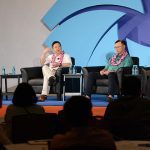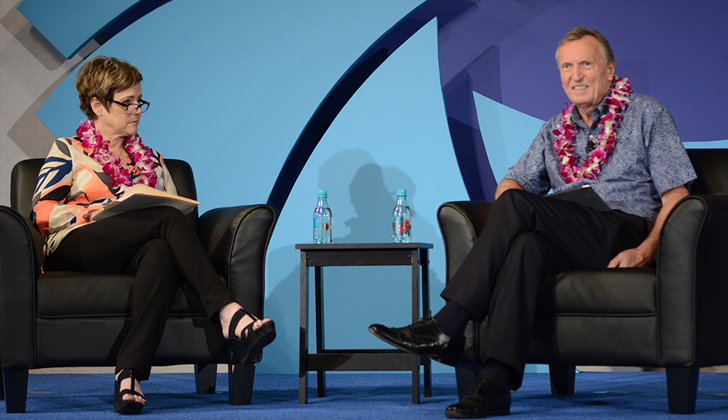
PTC’17 Keynote interview with ITU Deputy Secretary-General Malcolm Johnson: The Business Case for Sustainable Development Goals
An interview with ITU’s Deputy Secretary-General Malcolm Johnson
Let’s reimagine ICT as a global superpower. It certainly looks like one: capable of massive reach, grasp and a remarkable capability to change lives everywhere.
Even so, it’s a superpower that comes with difficulties—and, even–paradoxes. Globally, big gaps remain. An ICT divide still rules between the haves and have nots in many places. And, this superpower seems frustratingly difficult to wield globally to solve the really big socio-economic demands that people ask of it.
This superpower, and these paradoxes, routinely appear in various identities on the Geneva desk of Malcolm Johnson, Deputy Secretary-General of the International Telecommunication Union. In a recent interview with PTC from his ITU office, Mr. Johnson argued for new thinking – and renewed effort to solve them.
The superpower has hardly touched the lives of millions. Mr. Johnson ticks off the bare statistics outlining the challenge: “Today there are still 3.9 billion people, more than half of the world’s population, who have no access to the Internet. Two out of every three offline individuals are in the Asia-Pacific region. More than half of the total offline population comes from only five Asia-Pacific countries.” He says baldly: “This is unacceptable, especially when we know the importance of ICTs to empower people and catalyse socio-economic development.”
Solving the great divide
Part of the problem is diversity of lifestyles. Asia-Pacific has huge populations and mega-cities. Mr. Johnson points out city populations often enjoy sophisticated ICT services because ICT suppliers can service large numbers of customers relatively easily and profitably. But likewise “the region also has many tiny countries, with very remote and rural communities where the business case is not comparable and the technical challenges are much greater.”
Some have particular needs, most notably the island nations. He says, “globally, the group of around 50 Small Island Developing States (SIDS) is a distinct group of developing countries facing specific social, economic and environmental vulnerabilities including vulnerability to natural disasters.”
ITU needs to supply capacity building and training and, often, direct assistance to fill the gap. Over the last few years, emergency equipment assistance was provided to several SIDS that were hit by natural disasters, including Haiti, Fiji, and Dominica, Vanuatu, and others. ITU has mainstreamed, says Mr. Johnson, the needs of SIDS in all its activities, initiatives, programmes and projects to assist them in bridging the digital divide. ITU also helps to implement the Samoa Pathway, the programme adopted at the Third International Conference on Small Island Developing States which was held in Apia, Samoa, in 2014.
He welcomes the upsurge of new connectivity in the Pacific: “I was pleased to learn during the recent PTC Annual Conference that thanks to the work of various development agencies things are changing, with undersea cable landings and satellite services coming on-stream which will revolutionise these communities and give them the same opportunities as are enjoyed in the more advanced economies.”
But development is a complex process and grappling with these challenges is not easy, and in some sense, work still needs to be done to identify the true underlying issues. He points out: “Connectivity [for example] is often seen as the challenge, sometimes the only challenge, however, statistics show this not to be the case. Some 85% of the world’s population is covered by at least 3G services, yet less than 50% of people are connected. It’s no use providing connectivity if people cannot afford the service, don’t understand it or see no benefit to them.”
As a result, he favours a targeted incentivization: “There needs to be incentives: subsidizing the cost to the poorest; educating people on how to make best use of the technology; and developing the local content and services that people can relate to and see the benefit of.”
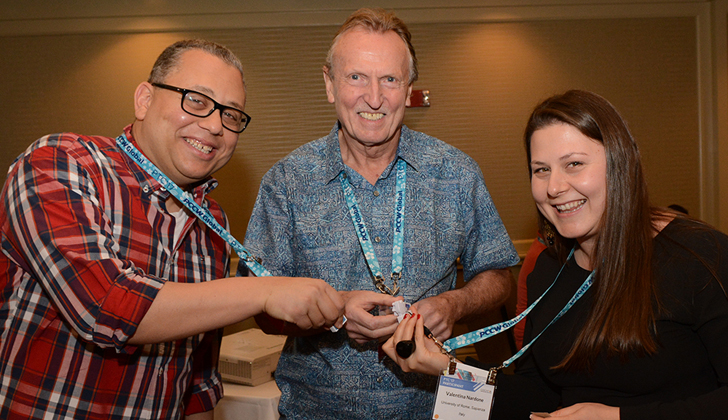
Mr. Johnson connects via Poken with PTC Young Scholars at PTC’17
Do the SDGs need superpowering?
Meanwhile, the ICT superpower has to meet new global agendas. In the background are the UN’s 17 Sustainable Development Goals (SDGs). Malcolm Johnson acknowledges they are “very ambitious”, pointing out they call for “an end to poverty and hunger, providing quality education for all, and bringing clean water and sanitation to everyone, all by 2030!” They will be a challenge for all countries, not just developing countries, he points out. Remarkably, no country currently meets all the SDG targets.
SDG proposals initially met a mixed reception in the ICT community because they appeared to underplay the importance of ICT in achieving these goals. Mr Johnson says this is no longer the case: “If you look at the targets that have been set to achieve these goals it is becoming more widely recognised that ICTs will play a vital role….as cross-cutting enablers of the SDGs.”
He continues with a rationale: “Let’s take some examples: halving the number of deaths and injuries on the road–this will only be achieved by using smart transport management techniques, including collision avoidance radar and autonomous vehicles; doubling the rate of energy efficiency–this will require widespread use of smart meters and innovative energy saving solutions; substantially increasing water-use efficiency will rely on ICTs to control irrigation and identify and remedy water leaks; combating climate change can only be achieved by reducing greenhouse gas emissions through clean technologies.”
Closing the loop will be better political engagement in each country involved coming from a need to report actual progress back to the UN annually. He points out the commercial drivers will also be evident: “As I mentioned at PTC’17 this year, implementation of the SDGs could see an estimated increase in ICT sector turnover of USD 2.2 billion per year by 2030.”
Pushing the partnership
Getting there will only be possible by close public-private partnerships, he argues, emphasizing “collaboration, cooperation and coordination”. The SDG framework is one, albeit major, vehicle. But this also means working beyond ICT sectoral interests into other industrial and commercial sectors. “ITU needs to attract these wide-ranging industrial interests to take part in its work,” Malcolm Johnson suggests, “whilst at the same time co-ordinating with other intergovernmental agencies to avoid duplication of effort, pool resources and bring our different competences to the common good.”
Nevertheless, this remains a challenge and comes at a time when some in the Internet community have railed against the involvement – particularly in Internet governance issues – of any intergovernmental agencies, fearing that an increase in unwarranted, top-down national or foreign control will result. But he argues that interacting with new and complex ecosystems outside the traditional ICT framework will expand our ideas of partnership and policymaking. Other sectors such as healthcare or banking which could see huge ICT investment are already rooted in complex and highly regulated national and international contexts themselves that any major ICT initiative will certainly need to accommodate.
He predicts, “ITU has a major role to play in achieving this goal. Connecting the unconnected is at the core of what ITU does, and has been doing throughout its long history.”
ITU’s own portfolio is increasing, he says, but it continues to provide bedrock support to the international ICT community in the harmonisation of the use of the radio spectrum at a global level, as well as coordination of the use of satellite orbits and development of the international technical standards that most telecommunication networks and applications use. Many of these developments stem from consensus and not top-down direction, he points out.
On a basic level, he argues, this model of international co-operation and consensus could be extended into other domains where appropriate. Without common international agreements, he points out, there would be “chaos”: “mobile phones could interfere with TVs, ships and aircraft would have no common means of communication, emergency services could fail to connect, satellites would interfere with each other, there would be no Internet, and the fact that every phone, fixed and mobile throughout the world, has a unique number is thanks to ITU.”
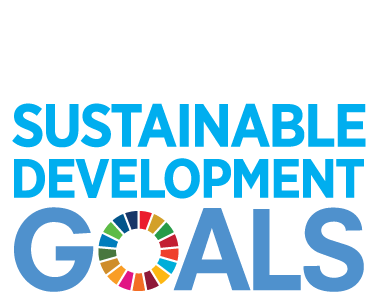
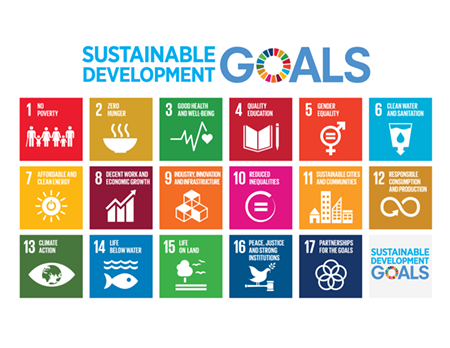
Sidebar: SDG snapshot
17 Goals, 169 Targets
- No poverty
- Zero hunger
- Good health and well-being
- Quality education
- Gender equality
- Clean water and sanitation
- Affordable and clean energy
- Decent work and economic growth
- Industry, innovation and infrastructure
- Reduced inequality
- Sustainable cities and communities
- Responsible consumption and production
- Climate action
- Life below water
- Life on land
- Peace, justice and strong institutions
- Partnerships for the goals
[In the UN HQ,] [t]he Division for Sustainable Development (DSD) seeks to provide leadership and catalyse action in promoting and coordinating implementation of internationally agreed development goals, including the seventeen Sustainable Development Goals (SDGs). Among other mandates, it hosts the secretariat for the High-level Political Forum on Sustainable Development (HLPF), the central platform within the United Nations system for the follow-up and review of the 2030 Agenda for Sustainable Development, adopted by Heads of State and Governments in September 2015. The 2030 Agenda is a new plan of action for people, planet and prosperity, with 17 SDGs and 169 associated targets at its core.
The work of the Division translates into six core functions: (1) Support to UN intergovernmental processes on sustainable development; (2) Analysis and policy development; (3) Capacity development at the request of Member States; (4) Inter-agency coordination; and (5) stakeholder engagement, partnerships, communication and outreach; and (6) Knowledge management.
In addition, the Division houses the SIDS Unit mandated to undertake the above-mentioned core functions in support of the further implementation of the SAMOA Pathway, the Mauritius Strategy for the further Implementation of the Barbados Programme of Action and the Barbados Programme of Action for the Sustainable Development of Small Island Developing States.



